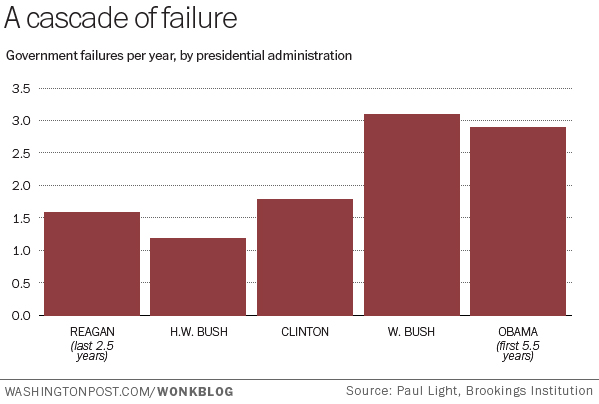We’re living through it:
Ingraham and Hamburger unpack Paul Light’s study:
Two factors complicate the failure rate under Obama. The first is that many of the missteps under Obama had their roots in the Bush administration. That administration “could have fixed the information technology systems that led to the healthcare.gov and veterans breakdowns, but didn’t. They could have fixed the civil service system that led to the problems in the Secret Service and the General Services Administration, but didn’t. And of course they could have fixed some of the policy problems that led to the 2008 financial collapse and the West, Texas fertilizer plant explosion, but didn’t.”
The other factor is the level of fierce Congressional opposition Obama has faced in office.
Light writes that political polarization is “a grand contributor” to the rise in government failure. But he notes that Democratic contributions mostly take the form of neglect and omission – they ignored “the slow decimation of government capacity, and refused to embrace the need for bold thinking on how to improve its performance.”
Republican contributions to government failure, on the other hand, have been “very deliberate.”
On the same general topic, Leonhardt gleans insights from Peter Schuck’s Why Government Fails So Often: And How It Can Do Better. One part of the solution:
Rigorous evaluation, randomized trials and social impact bonds will never stir the political passion that calls for universal health insurance or lower taxes do. If anything, measurement and accountability are destined to provoke more opposition – from interest groups that have something to lose – than support. (This opposition often takes the form of, “Measurement is hard,” as if that were a reason to skip it.)
But in a divided country, where Congress only rarely passes far-reaching legislation, a more effective government may be the best way for both sides to get more of what they want: a government that is limited enough to protect individual freedom and ambitious enough to improve people’s lives.
Update from a reader:
Honestly, what the fuck is that study supposed to mean? The government failed “2-3” times per year under Bush and Obama? If there was ever a study that meant nothing, that was entirely dependent on starting assumptions, this is it. You could quite easily say the government failed zero times, because we maintain the constitutional form and have not fallen into Somalia-style anarchy; or you could say it failed hundreds of thousands of times a year, because, e.g,, the passport office fucked up my application.
A quick glance at his methodology shows the study is really looking at popular media characterizations of stories they claim represent government failure, but even then, it’s subjective to the point of meaninglessness.
